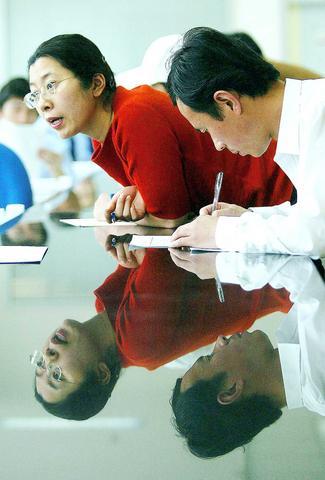The IMF yesterday downplayed the possible negative impact of a Chinese economic slowdown and a spike in oil prices on global growth, stressing China's share of world output and trade is relatively small.
Raghuram Rajan, director of the IMF's research department, said the effect would be negligible on energy-efficient Japan, the world's second-largest economy, which is forecast by the fund to grow 4 percent this year.

PHOTO: REUTERS
As for China, it is still too early to predict whether an expected credit tightening designed to avoid a boom-and-bust cycle would lead to a soft- or hard-landing for the world's sixth-largest economy and fourth-largest trader, Rajan said.
A slowdown in China economy -- which accounts for just under 4 percent of the total world output, compared with a combined 45 percent for the US and Japanese economies -- would certainly not threaten global growth, he said.
"China's GDP is big but not huge," Rajan said, adding the negative impact of a Chinese slowdown would not not an issue of magnitude but rather of how it affects business and consumer sentiment.
The IMF estimates that a slowdown in China from last year's 9.1 percent growth would reduce world output by only 0.3 percentage points in the short term and 0.75 percentage point "in several years."
This is based on the IMF's assumption that booming investment in China slows by 5.5 percent, imports drop 10 percent and GDP falls 4 percentage points this year.
Most of the expected slowdown will affect its Asian neighbours, with Japan seeing a 0.5 percentage point drag in the long term and newly industrializing economies a full percentage point, Rajan said.
"China is not a huge part of world trade," he said. "Also re-exports to the US and Europe are unlikely to be affected by a Chinese slowdown."
The negative impact on the US economy, the world's largest, would be minimal, estimated at only 0.1 to 0.2 percentage point, Rajan said.
Mariko Watanabe, research fellow at the Japanese government's Institute of Developing Economies, agreed that the Chinese economy, which is still small relative to the country's population, was unlikely to crash or trigger another Asian crisis.
"I also doubt if its growth rate is actually going to slump," she said. "The Chinese authorities have taken pre-emptive action and therefore they may not have to tighten too much later."
Rajan also expressed a degree of optimism about the effect of surging energy costs on corporate investment as well as personal consumption.
Just over half of the recent sharp rise in crude oil prices "can be attributed to strong demand in the US and China," while 13 percent to 17 percent is estimated to have stemmed from the depreciation of the dollar, he said, adding supply constraints would account for only about 17 percent.

The CIA has a message for Chinese government officials worried about their place in Chinese President Xi Jinping’s (習近平) government: Come work with us. The agency released two Mandarin-language videos on social media on Thursday inviting disgruntled officials to contact the CIA. The recruitment videos posted on YouTube and X racked up more than 5 million views combined in their first day. The outreach comes as CIA Director John Ratcliffe has vowed to boost the agency’s use of intelligence from human sources and its focus on China, which has recently targeted US officials with its own espionage operations. The videos are “aimed at

STEADFAST FRIEND: The bills encourage increased Taiwan-US engagement and address China’s distortion of UN Resolution 2758 to isolate Taiwan internationally The Presidential Office yesterday thanked the US House of Representatives for unanimously passing two Taiwan-related bills highlighting its solid support for Taiwan’s democracy and global participation, and for deepening bilateral relations. One of the bills, the Taiwan Assurance Implementation Act, requires the US Department of State to periodically review its guidelines for engagement with Taiwan, and report to the US Congress on the guidelines and plans to lift self-imposed limitations on US-Taiwan engagement. The other bill is the Taiwan International Solidarity Act, which clarifies that UN Resolution 2758 does not address the issue of the representation of Taiwan or its people in

US Indo-Pacific Commander Admiral Samuel Paparo on Friday expressed concern over the rate at which China is diversifying its military exercises, the Financial Times (FT) reported on Saturday. “The rates of change on the depth and breadth of their exercises is the one non-linear effect that I’ve seen in the last year that wakes me up at night or keeps me up at night,” Paparo was quoted by FT as saying while attending the annual Sedona Forum at the McCain Institute in Arizona. Paparo also expressed concern over the speed with which China was expanding its military. While the US

SHIFT: Taiwan’s better-than-expected first-quarter GDP and signs of weakness in the US have driven global capital back to emerging markets, the central bank head said The central bank yesterday blamed market speculation for the steep rise in the local currency, and urged exporters and financial institutions to stay calm and stop panic sell-offs to avoid hurting their own profitability. The nation’s top monetary policymaker said that it would step in, if necessary, to maintain order and stability in the foreign exchange market. The remarks came as the NT dollar yesterday closed up NT$0.919 to NT$30.145 against the US dollar in Taipei trading, after rising as high as NT$29.59 in intraday trading. The local currency has surged 5.85 percent against the greenback over the past two sessions, central